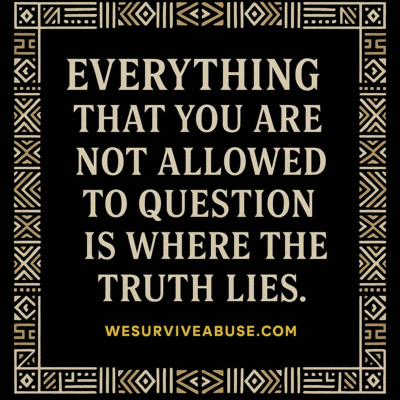"I'd lie for you. I'd die for you. Ride or die for you"- a woman or girl for a a man she admires/likes/lovesThere’s a saying that floats around on
“I’d lie for you. I’d die for you. Ride or die for you”- a woman or girl for a a man she admires/likes/loves

There’s a saying that floats around online:
“If a woman likes you, you don’t even have to lie too much. She’ll start lying to herself on your behalf.”
Whew.
It cuts deep.
Because for too many of us—if we’re honest—it’s not just a clever observation. It’s a mirror.
This is how the world conditions us and without intentional, sustained, and dedicated unlearning; this may be where we remain.
Too many women have been taught by family and society to protect the men they love, admire, or even simply want to believe in—at the cost of other women’s safety, truth, and dignity. Sometimes even at the cost of their own.
What does this look like?
It shows up in quiet homes and loud group chats. In school board meetings. In churches. On social media. In workplaces. In friendships. In protest spaces. In families.
Let’s talk about where and how women lie to themselves—and others—for men:
1. In Romantic Relationships
She knows he’s cheating.
She knows he raises his voice too often, crosses lines, controls money, deletes texts.
But she says, “He’s under stress.”
“He didn’t mean it.”
“She’s jealous.”
“She provoked him.”
She starts lying to herself so she can keep what she wants the world to see: A relationship that’s “real.” A man who’s “trying.” A love that’s “worth it.”
She’ll attack the other woman. She’ll isolate herself from friends who raise concerns.
She’ll call Survivors bitter. Dramatic. Mean. Crazy.
All while swallowing her own pain.
Protecting a man—and a fantasy.
2. In Platonic Friendships
He’s her homie. Her childhood friend. Her “brother.”
And when another woman says: “He hurt me.”
She says: “Not him.”
“He’s a good guy.”
“He’s not like that.”
“Are you sure it wasn’t a misunderstanding?”
She doesn’t even realize it—but she’s accusing the victim while defending someone who never needed her defense.
The lie?
That knowing someone means they’re incapable of causing harm.
But proximity is not proof of character.
3. With Men They Admire or Follow
Pastors. Podcasters. Politicians. Professors. “Progressive” men online.
He says all the right things.
He quotes bell hooks. Marches on the front lines.
He teaches feminism, therapy, abolition.
But when women speak out about his harm, his coercion, his manipulation?
Suddenly, women rush to his defense:
“We don’t know the whole story.”
“They’re trying to bring down a good man.”
“We can’t lose another voice for the movement.”
But what are we building if we must throw women under the bus to keep the “movement” going?
When did justice start requiring silence from the harmed?
4. In Family Structures
That uncle. That cousin. That stepfather.
Too many women grew up being told:
“Don’t sit on his lap.”
“Stay in your room when he’s over.”
“Just ignore him.”
And yet when another woman brings harm to light, she’s told:
“He’s old now.”
“That was a long time ago.”
“He didn’t mean it like that.”
Sometimes women lie to themselves because the truth would mean everything they endured was real—and never should’ve happened.
 Why Do We Do This?
Why Do We Do This?
Because we’re trained to believe men are worth preserving, even at the cost of women.
Because the world rewards loyalty to men more than loyalty to truth.
Because we don’t want to admit that someone we loved, trusted, or believed in—was harmful.
Because we don’t want to be like “those bitter women.”
But listen, beloved:
There is nothing bitter about telling the truth.
There is nothing holy about protecting harm.
And there is nothing noble about lying to yourself for a man who would never lie for you.
When Women Attack Other Women for Men
This is where the lie becomes violence.
When a woman says, “He assaulted me,” and another woman says, “She’s lying,”
She becomes part of the harm.
When a Survivor speaks out and women gather to “defend” him, post memes, write think pieces, and create entire platforms to discredit her?
That’s not just painful—it’s dangerous.
Sometimes, it’s women who do the dirtiest work of upholding men’s reputations.
The man stays silent, while women tear each other apart.
Meanwhile, truth dies.
And harm wins.
 But There Is Another Way
But There Is Another Way
You can love someone and still hold them accountable.
You can grieve a relationship while telling the truth about how it harmed you.
You can acknowledge someone’s good qualities and their violence.
We are more powerful than the lies we’ve inherited.
And our loyalty should not lie with someone’s image—but with truth, safety, and the women who are brave enough to speak.
A Gentle Call to Action
Ask yourself: Who have I defended, even when the truth made me uncomfortable?
When a woman says she was harmed, can you sit with her words before rushing to his defense?
Are you lying to yourself about someone right now—because you want to believe he’s good?
You deserve truth.
And so do the women around you.
We all do.
Let the truth be what you protect—not the illusion.
✨ Reflection Questions
Have I ever found myself defending someone simply because I liked or admired them?
How does it feel in my body when I hear a woman speak her truth—especially when it disrupts what I want to believe?
What does true loyalty to women look like in a world that trains us to protect men first?
💎 “When the drum speaks, even the deaf can hear.”
— African Proverb
Truth has a sound of its own. And it echoes long after silence has faded.
[rosaschildren.com] | [wesurviveabuse.com] | [survivoraffirmations.com]
Share if you feel safe and ready—your voice might be the lifeline someone else needs. And if you do share, remember to cite the messenger. Words carry legacy.
 Why Do We Do This?
Why Do We Do This? But There Is Another Way
But There Is Another Way